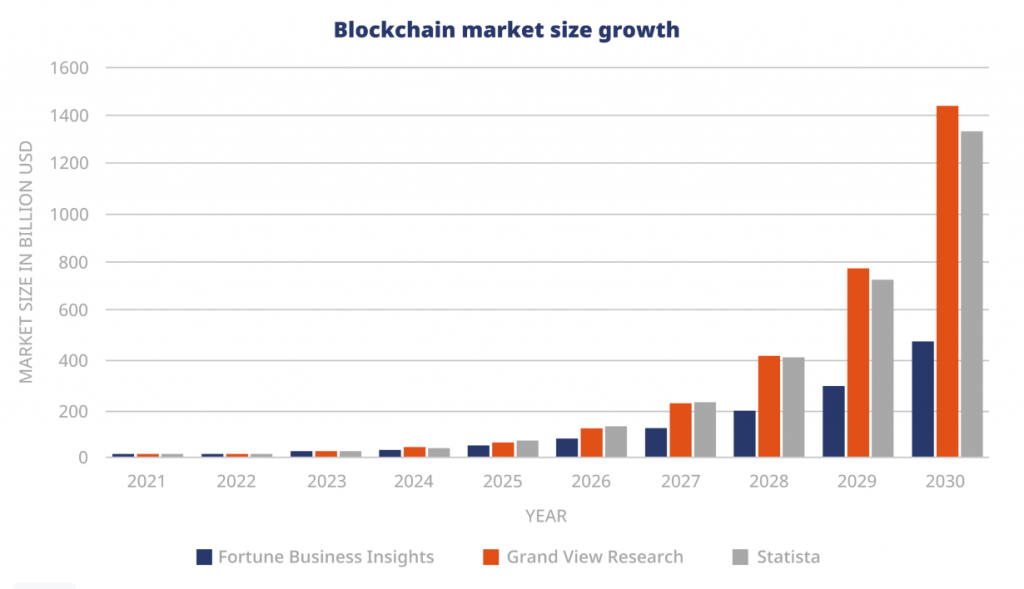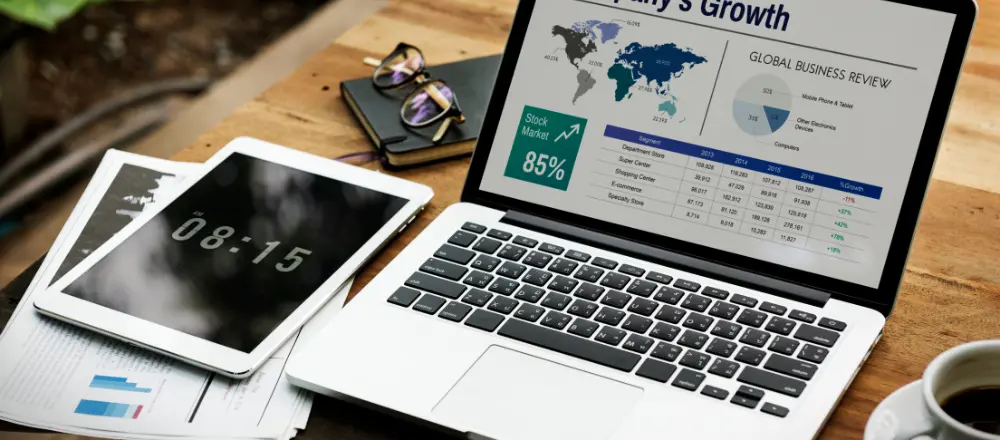Blockchain decentralizes trust via distributed ledgers enabling transparent digital interactions. Their synergy achieves unprecedented privacy, trust, and optimization across industries.
AI-blockchain’s promise prompted our examination of blockchain applications in construction sectors. We analyzed strategic integration approaches to maximize benefits while addressing privacy and ethical challenges crucial for responsible development.
This post explores the use cases, benefits, challenges, and future trends of blockchain for construction, providing insights into how this technology can reshape the industry.
Table of Contents
Statistics About Blockchain for Construction
The adoption of blockchain technology for construction industry is on the rise. According to a report by Market Research Future, the blockchain market in construction is expected to grow significantly over the next few years. Here are some key statistics:
- Market Growth: The global blockchain technology for construction is projected to reach USD 1.64 billion by 2025, growing at a CAGR of 48.37% from 2019 to 2025.
- Adoption Rates: A survey conducted by Deloitte found that 40% of construction executives believe that blockchain will be critical for their business operations within the next five years.
- Efficiency Gains: According to PwC, companies implementing blockchain can expect efficiency gains of up to 30% in project delivery times due to improved transparency and reduced administrative costs.
- Fraud Reduction: The use of blockchain can reduce fraud risk by up to 50%, as it provides an immutable record of all transactions and activities related to a construction project.
- Smart Contracts: A study by Gartner indicates that by 2025, 30% of organizations will use smart contracts in their business processes, significantly impacting how contracts are managed in construction.

Source:- electroiq.com
These statistics highlight the growing recognition of blockchain’s potential to transform the construction industry by enhancing efficiency, transparency, and security.
Top Use Cases of Blockchain in the Construction Industry
The integration of blockchain technology into the construction industry offers numerous use cases. These use cases of blockchain for construction address critical challenges while enhancing operational efficiency across various sectors. From securing project data to streamlining payments with smart contracts, these applications demonstrate how blockchain can revolutionize traditional practices within construction projects. Below are several key use cases of blockchain for construction.
Securing Project Data and Documentation
One of the most significant advantages of using blockchain technology for construction is its ability to secure project data and documentation. Traditional methods often rely on centralized databases that are vulnerable to hacking or unauthorized access. In contrast, blockchain provides a decentralized ledger where all project-related documents are stored securely across multiple nodes.
This decentralized approach ensures that data integrity is maintained; once information is recorded on the blockchain, it cannot be altered or deleted without consensus from network participants. This feature helps prevent disputes regarding project documentation by providing an immutable record of all changes made throughout the project’s lifecycle.
Enhancing Supply Chain Management and Tracking
Blockchain technology enhances supply chain management in construction by providing real-time visibility into material flows from suppliers to job sites. This enhanced tracking capability allows organizations to identify bottlenecks or delays quickly, enabling them to take proactive measures to mitigate issues before they escalate into significant problems.
Smart contracts can further streamline supply chain processes by automating payment releases upon successful delivery verification. This reduces administrative overheads associated with manual payment processing while ensuring timely payments for suppliers based on agreed-upon terms.
A real-world example is VeChain, as it employs blockchain technology to improve supply chain, including construction. By leveraging VeChain’s platform, companies can ensure that materials used meet quality standards while maintaining transparent records accessible by all stakeholders involved.
Streamlining Payments with Smart Contracts
Smart contracts are self-executing contracts with the terms directly written into code on the blockchain. They automate payment processes in construction projects by releasing funds only when specific conditions are met—such as successful completion milestones or delivery confirmations.
This automation reduces administrative burdens associated with traditional payment methods while minimizing disputes related to payment timelines or amounts owed. By ensuring that payments are made promptly upon verification of work completed or materials delivered, smart contracts help maintain positive relationships between contractors and suppliers.
Improving Project Management and Workflow
Blockchain for construction enhances project management by creating a secure, shared platform for all stakeholders. Real-time access to immutable project data helps managers track progress and identify potential delays early. Transparent records facilitate better communication and collaboration among teams, driving efficiency and ensuring everyone is on the same page. This system improves resource allocation and task prioritization, leading to better project outcomes and streamlined workflows.
Certification of Materials and Equipment
Blockchain simplifies the cumbersome process of material certification in construction. It provides a secure and immutable storage for certifications, ensuring authenticity and easy verification. By recording certifications on a blockchain accessible to authorized parties, organizations eliminate bureaucratic paperwork and enable efficient auditing. Verified records ensure compliance with regulations, maintaining quality and trust throughout the project.
Building Information Modeling (BIM) Integration
Integrating BIM with blockchain enhances collaboration among stakeholders throughout the project lifecycle. Decentralized networks enable secure sharing of critical information between architects, engineers, and contractors. Real-time updates ensure everyone has access to the latest design specifications, driving efficiency. Smart contracts automate workflows related to approvals and revisions, reducing delays caused by manual processes. Autodesk is a great example, as they leverage BIM alongside blockchain to streamline processes.
Digital Identity Verification for Workers
Blockchain-powered digital identity verification enhances security on construction sites. Decentralized identities ensure workers’ credentials are securely verified, preventing unauthorized access and reducing safety risks. Integrating biometric authentication further strengthens verification, ensuring compliance with regulations. Companies like Everledger use blockchain to verify identities across supply chains, including construction, to maintain high compliance standards.
Sustainable Material Tracking
Blockchain for construction enhances sustainable material tracking through real-time insights, integrating AI to unlock valuable functionalities. Tracking relies on accurate data from diverse sources, enhancing overall resilience in operations. Power Ledger exemplifies this integration, using AI-powered analytics alongside blockchain to optimize sustainable material tracking, fostering eco-friendly practices.
Subcontractor Performance Tracking
Blockchain ensures effective tracking of subcontractor performance, maintaining high accountability. It provides secure storage for performance metrics, allowing objective evaluation based on verifiable data. Smart contracts automate payment releases upon task completion, reducing disputes and enhancing relationships. Procore integrates performance tracking with blockchain, optimizing subcontractor management and driving project success.
Worker Safety Monitoring
Blockchain enhances worker safety monitoring through real-time insights and AI integration. Accurate data from various sources, combined with blockchain’s security, creates opportunities to improve safety protocols. SmartCap Technologies uses AI-powered analytics alongside blockchain to optimize worker safety monitoring, enhancing overall resilience in daily operations.
Efficient Permitting and Approvals
Blockchain streamlines permitting and approval processes by integrating data from diverse sources with AI. This integration optimizes efficiency levels and drives project success. Civic Ledger uses blockchain to integrate permitting approval processes, leading to more efficient and transparent operations.
Energy Consumption Tracking
Blockchain helps optimize energy consumption tracking through AI-powered analytics. Securely stored data ensures transparency. The Energy Web Foundation uses advanced analytics and blockchain to optimize energy consumption tracking, enhancing resilience in daily operations.
Waste Reduction and Recycling Verification
Blockchain enhances waste reduction and recycling verification by integrating data from diverse sources with AI, creating valuable functionalities and ensuring transparent tracking.
Green Building Certification
Blockchain ensures transparent tracking of green building certifications through AI integration. The resulting functionalities support sustainability efforts and offer a reliable verification system.
Construction Financing and Loan Management
Blockchain optimizes construction financing and loan management by integrating data from diverse sources with AI. The improved functionalities ensure secure and transparent financial operations.
Worker Time Tracking and Payroll
Blockchain automates worker time tracking and payroll by integrating real-time insights from diverse sources with AI. The improved functionalities enhance accuracy and efficiency in payroll processes.
Design Revision and Version Control
Blockchain enhances design revision and version control by integrating data from diverse sources with AI. The resulting functionalities streamline the revision process and ensure that all stakeholders have access to the latest information.
Weather-Related Risk Management
Blockchain enables weather-related risk management by integrating real-time data from diverse sources with AI. The resulting functionalities help mitigate risks and improve project resilience.
Building Code and Standard Compliance Tracking
Blockchain improves building code and standard compliance tracking by integrating data from diverse sources with AI. This ensures that all stakeholders can verify compliance and maintain quality standards.
Automated Inventory Management
Blockchain automates inventory management by integrating real-time insights from diverse sources with AI. This ensures accurate tracking and efficient resource allocation.
Key Benefits of Blockchain for Construction Projects
Integrating AI and blockchain overcomes standalone limitations, unlocking transformative synergies that boost capabilities through mutually reinforced strengths. Key advantages of AI+blockchain integration include:
Data Privacy and Ownership
Blockchain provides a foundation for personal data control with selective sharing while AI handles data compliantly via authorized access. Users retain ownership as their privacy preferences are respected.
Scalable Data Infrastructure
Blockchain facilitates globally distributed AI training at scale across devices respecting individual data preferences. AI thrives with verifiable, permissioned access to vast cryptographically secure datasets.
Transparency and Auditability
Blockchain records AI processing, dataset provenance, outputs transparently. AI fosters responsibility with clarity into its decision-making using the permanent ledger for audits.
Automation and Streamlined Workflows
AI optimizes workflows which can then self-execute on blockchain. This automation boosts coordination, collaboration and optimized processes across stakeholders.
Incentivized Innovation
Built-in token incentives decentralizes data science encouraging globally participatory, trustworthy AI research markets that reward advances fairly.
Security and Reliability
By integrating Blockchain for Data Security oversight with encryption, private keys and consensus, blockchain AI aims to achieve both high utility and cryptographic guarantees enhancing trust in technology.
Adaptability and Scalability
AI enhances blockchain interoperability, predictive scaling while blockchain’s permanent storage powers models with open access to vast, secure datasets aiding continual improvement.
Decentralized Data Ownership
Blockchain secures verifiably assigned data ownership allowing users to control access for AI model training in a way that protects privacy while fueling broader research.
So, through synergistically resolving each other’s deficits, AI and blockchain establishes decentralized intelligence through amplified security, transparency, scalability and coordinated problem-solving abilities at an unprecedented societal scale.
Challenges of Implementing Blockchain in Construction
Like any disruptive technology, significant challenges must be addressed for blockchain in construction to reach its full potential. Key issues include:
Interoperability Standards
Unified protocols are needed for seamless interaction, data and value transfer between AI systems and disparate blockchain networks which currently struggle to interface natively.
Resource Constraints
Initial infrastructure costs and ongoing management of nodes is resource-intensive. Cost-effectively distributed computing is required to support models across vast blockchain networks.
Legal and Regulatory Compliance
Developing holistic regulations and governance standards that foster innovation while protecting consumers as these technologies further entwine globally.
Skill and Expertise Shortage
Specialized blockchain in the construction industry are scarce. Growing technical competencies industry-wide is crucial for successful blockchain development services and adoption.
Interpretability and Bias
As ML models grow more complex, non-technical users struggle to interpret outputs or identify unfair biases. Transparency aids functionality and adoption at enterprise scale.
Data Silos and Privacy
Silos impede distributed training of globally beneficial models without surrendering sensitive information. Stringent privacy yet collaborative data exchange is paramount.
Energy Consumption
Early blockchain protocols consumed vast energy due to proof-of-work. Eco-friendly alternatives can decentralize while maintaining security at planetary scale.
However, challenges serve as opportunities to bolster each technology through prudent coordination. Addressing issues proactively yields synergistic frameworks amplifying their individual strengths and minimizing limitations – future-proofing their progressive co-evolution.
Solutions to Blockchain Implementation Challenges
Addressing integration challenges demands nuanced, collaborative solutions informed by theory and practice. Below are potential strategies to overcome hurdles and maximize AI+ blockchain’s synergistic benefits:
Standardization Roadmaps
Multi-stakeholder consortiums devise standards accommodating interoperability and gradual integration without compromising distinct properties or capacities.
Edge and Fog Computing
Distributed computing restructures data processing geographically for localized analytics and reduced latency, distributing workloads to enhance scalability sustainably.
Homomorphic Encryption
Cryptographic techniques enable analyzed processing on ciphertext, supporting privacy-preserving insights from encrypted datasets without decryption.
Cross-Chain Integration
Inter-blockchain technologies interconnect networks natively without system-specific protocols, simplifying data/asset flows globally in a privacy-enhancing manner.
Regulation Sandboxes
Regulatory pilot programs support prudent prototyping and feedback to iteratively frame risk-proportionate governance considering exponentially advancing technologies.
Incentivized Data Contributions
Tokenized incentive models motivate collaborative data and compute provision transparently, fueling data science progress through cohesive value transfer.
Education and Awareness
Widespread understanding always impediments like conceptual opacity and resistance, accelerating responsible innovation through transparent, inclusive knowledge dissemination.
Collaborative R&D Consortia
Cross-sector cooperation seed-funds research addressing interoperability, auditing consensus, and applying AI to optimize core infrastructure components like mining.
Concerted addressing of integration challenges can optimize blockchain applications in construction, democratizing what would otherwise remain inaccessible technical advantages. Cooperative mitigation secures development trajectories.
Future Trends: Blockchain’s Role in Construction Beyond 2025
The integration of blockchain with AI is poised to exponentially expand in coming years, influencing numerous industries and driving next-generation computing paradigms through convergence. Major future directions are outlined below.
Metaverse/Web3 Advancements
Blockchain virtual/augmented worlds leverage AI for adaptive simulation, decentralized governance, personalized experiences and user-generated content distribution at massive scales.
Continued Convergence
Deeper coordination optimizes performance through streamlined interoperability as AI and blockchain co-evolve into more symbiotic pairings providing unified experiences.
Regulatory Maturation
Advancing frameworks help realize potential while safeguarding users, with policy promoting responsible innovation based on evidence rather than precedent.
Decentralized Machine Learning
Blockchain expands AI model sharing, iterative training across edge devices and datasets, incentivizing participation in collective betterment.
New Data-Driven Business Models
Organizations reimagine value propositions in digital ecosystems capitalizing on AI and blockchain synergies surfacing novel data services and tokenized incentives.
Efficiency Applications Emerge
Novel market adjacencies materialize as blockchain’s autonomous coordination amplifies AI’s analytical strengths across energy, transportation and socially impactful industries.
Ubiquitous AI Readiness
Blockchain’s data security and software autonomy ensures AI proliferation through purpose-built, democratized infrastructure minimizing data advantage concentration risks.
Realizing this future requires addressing open challenges forthrightly while cultivating an integration culture that safeguards responsibility as capabilities multiply. With astute guidance, AI+ blockchain’s immense promise can reshape global systems positively through decentralized intelligence working for all.
How A3Logics Can Help You Implement Blockchain for the Construction Industry?
A3Logics is committed to helping organizations leverage blockchain technology for enhanced efficiency and transparency in construction projects. Our expertise in Blockchain Software Development Services allows us to offer tailored solutions that meet the unique needs of the construction sector.
- Customized Blockchain Solutions: We provide bespoke blockchain solutions designed specifically for blockchain applications in construction, ensuring they align with your business objectives and operational requirements.
- Smart Contract Development: Our team specializes in developing smart contracts that automate processes such as payments and approvals, reducing administrative burdens and enhancing workflow efficiency.
- Integration with Existing Systems: We assist in seamlessly integrating blockchain technology with your existing systems, ensuring minimal disruption during implementation while maximizing the benefits of both technologies.
- Training and Support: A3Logics offers comprehensive training programs for your workforce, equipping them with the necessary skills to utilize blockchain effectively in their daily operations.
- Consultation Services: Our blockchain consulting services provide insights into best practices for implementing blockchain solutions tailored specifically for your construction projects.
By partnering with A3Logics, you can harness the full potential of blockchain technology to drive innovation and success in your construction initiatives.
Conclusion
In conclusion, the integration of Blockchain in the Supply Chain and construction industry presents a transformative opportunity to enhance efficiency, transparency, and security across various processes. From securing project data to streamlining payments through smart contracts, the use cases of blockchain for construction are vast and varied. While challenges exist in implementing these technologies, solutions are available that can help organizations navigate these obstacles effectively.
As we move forward into an increasingly digital landscape, embracing innovations like blockchain will be essential for future-proofing construction practices. By leveraging the strengths of blockchain alongside existing technologies like AI, companies can build a more resilient and efficient construction ecosystem that meets the demands of tomorrow’s projects. So, if you are looking to hire blockchain developers, do not hesitate and connect with A3Logics now!
FAQ’s
How does Blockchain improve transparency and trust in construction projects?
Imagine a shared digital record book that everyone on a construction project can see. Blockchain is that book. Every transaction, delivery, or change is recorded there, and nobody can secretly alter it. Because everyone sees the same, verified information, trust goes up, and misunderstandings go down. It’s like having a reliable witness to every step of the project.
Can Blockchain reduce construction project delays?
Yes! Think of blockchain as a super-efficient project manager. It helps everyone communicate better and stay on the same page. It can also automate payments when certain tasks are done, preventing payment arguments that often cause delays. With blockchain, everyone knows what’s happening and what they need to do, so projects run smoother and faster.
What are smart contracts, and how do they benefit construction?
Smart contracts are like digital agreements that automatically carry out the terms you set. For example, a smart contract could automatically release payment to a supplier once materials are delivered to the construction site. This eliminates paperwork, speeds up payments, and reduces the chance of disagreements. It’s like having a reliable robot that enforces the contract fairly for everyone.
Is Blockchain cost-effective for small construction companies?
At first, using blockchain for real estate might seem expensive. You may need to invest in new technology and training. However, over time, blockchain can save small companies money. It reduces paperwork, speeds up payments, and prevents fraud. These savings can add up and make blockchain a worthwhile investment in the long run.





